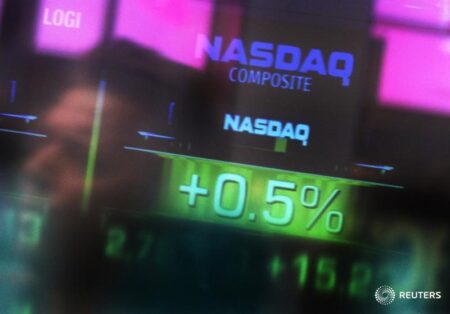Investing.com– The Dow wrapped up a difficult with strong gains Friday, a day after snapping its longest losing streak since 1974 as cooler-than-expected inflation data eased concern that the Federal Reserve could turn even more hawkish next year.
At 4:00 p.m. ET (21:00 GMT), the rose 497 points, or 1.2%, but ended the week lower following its 1100 point slump earlier this week. The index gained 1.1%, and the added 1.1%.
PCE cooler than expected
Treasury yields fell after data showing that inflation cooled in November, eased investor fears of an even more hawkish Federal Reserve next year.
The widely-watched release, the Fed’s preferred inflation gauge, rose 2.4% in November on an annual basis, compared with estimates of 2.5%. On a monthly basis, it rose just 0.1%.
Excluding volatile food and energy components, the core PCE rose 2.8%, compared with estimates of 2.9%.
This release calmed some concerns as upside risks to inflation were back on the Fed’s radar, with US consumer prices increasing by the most in seven months in November, and the potential for the new Donald Trump administration to authorise trade and tax policies that many see as inflationary.
“[W]e think the 12-month pace of core PCE will resume its downward trend in 1Q25 and, consequently, that the Fed will cut 25bp in March 2025,” Morgan Stanley (NYSE:) said in a recent note.
FedEx to spin off freight business
In corporate news, FedEx (NYSE:) stock gave up gains flat after the delivery giant reported better-than-expected earnings in the fiscal second quarter, while also announcing that it’s planning on spinning off its freight business.
Nike (NYSE:) stock fell 0.2% after the sportswear retailer flagged “severe issues” in its guidance, despite second-quarter results topping expectations.
Novo Nordisk A/S (NYSE:) fell more than 17% after results from a late-stage study showed the drugmaker’s weight-loss drug fell short of expectations.
US government shutdown looms
The threat of a US government slowdown was raised Thursday after a Republican bill that included Donald Trump’s demands for higher government spending and a raised debt ceiling was rejected in a vote in the House of Representatives, with several Republican senators also openly defying the President-elect.
The new bill replaced a bipartisan deal to approve government spending, after Trump and tech billionaire Elon Musk came out in opposition of the old deal.
Government funding is set to expire at midnight on Friday, marking the beginning of a partial government shutdown that could disrupt operations ranging from border security to travel. The disruption is expected to be particularly dire amid increased travel trends during the holiday season.
A government shutdown presents another layer of uncertainty for Wall Street, which was already nursing steep losses from earlier this week after the Federal Reserve cut interest rates but flagged a substantially slower pace of rate cuts in 2025.
(Peter Nurse, Ambar Warrick contributed to this article.)
Read the full article here
















